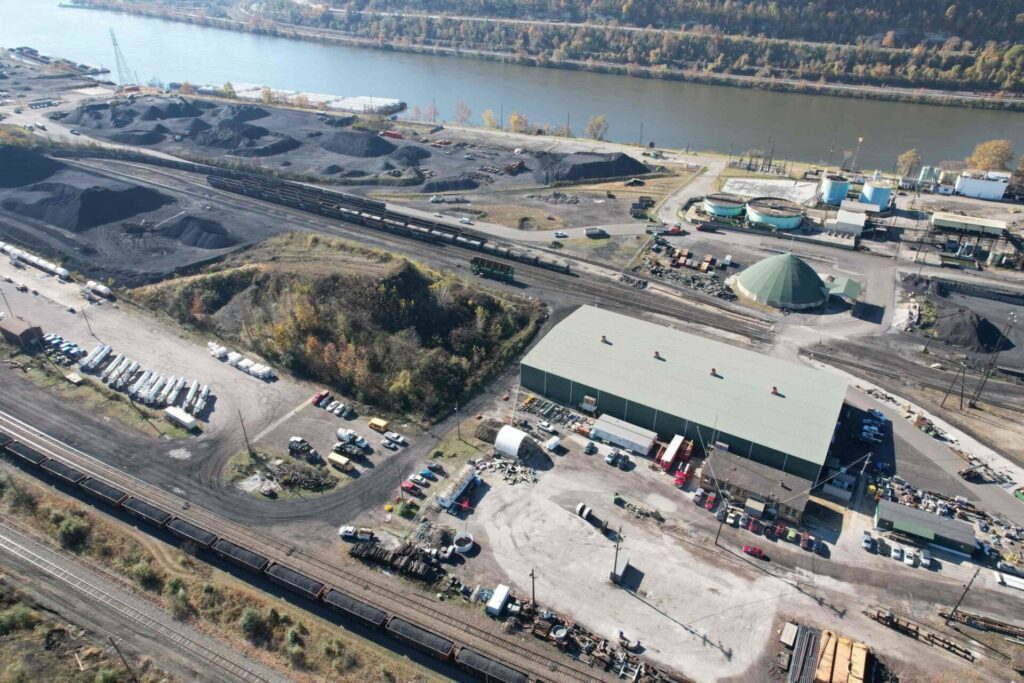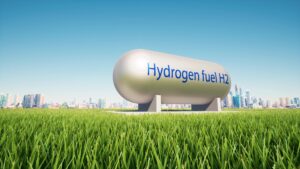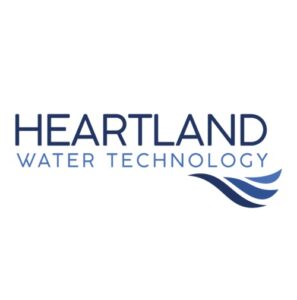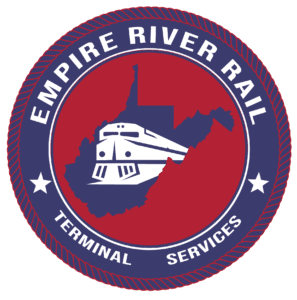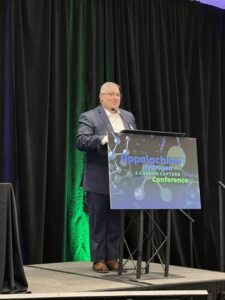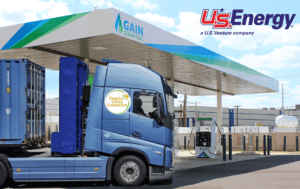FOLLANSBEE — Officials with Empire Diversified Energy led officials on a tour of the intermodal port they are developing at the city’s north end, while making a case for financial support for what they said can be a major economic boost to both the region and state.
“We’re trying to educate the public on what we’re building and what direction we want to go,” said Empire President Scott Ewusiak before he and other representatives of the company took vanloads of state and local officials and others on tours of the port property Wednesday.
Consisting of more than 8,000 acres of former Wheeling-Pittsburgh Steel property, including 8,000 linear feet of riverfront property, the site was dubbed the Port of West Virginia while the West Virginia Development Authority issued $25 million bonds for the development of wharf and dock facilities there.
Empire employs about 75 but could ultimately hire hundreds to staff separate enterprises eyed for the site, said Ewusiak.
Current plans for the property include four terminal sites with a total of 37 barge berths between the former Follansbee Steel and Wheeling-Pitt properties.
At a gathering at Weirton Millsop Community Center following the tour, Joe DiBartolomeo, the port’s director, said the site is well-suited for a regional port.
He said in addition to having access to nearly 20,000 linear feet of railroad, major highways provide easy access to Columbus and Pittsburgh and its airport- while Cleveland and Akron are within a 100-mile radius.
“We’re in a great spot. We just need to make the most of it,” said DiBartolomeo.
Plans call for a 3,600-foot intricate wall of steel piling that will extend about 70 feet from the riverbank to accommodate the lifting of heavy storage containers and the creation of an apron for storage of thousands of containers.
DiBartolomeo said the company is seeking federal funds to build the wall, which has an estimated cost of $25 million, and for improvements to a railroad bridge across the Ohio River, estimated at $20 million, to allow for more direct transport of materials to the Midwest.
Farley Wood, an engineer with Empire, said the company is in talks with MonPower about moving power lines extending across the riverfront property underground to establish acceptable clearance for cranes loading and unloading the barges.
DiBartolomeo noted U.S. Sen. Joe Manchin, D-W.Va., recently secured $4 million for the project and appealed to representatives of Manchin, U.S. Sen. Shelley Moore Capito, R-W.Va., and U.S. Rep. David McKinley, R-Wheeling, for additional funds.
Empire officials estimate they have invested $50 million into the property, which has undergone extensive rehabilitation since it was acquired by 6twelve Properties, a former company headed by Ewusiak, and Empire.
Ewusiak said miles of asbestos were removed from lines serving the former Koppers plant, while the company itself cleaned chemicals from them and its storage tanks before it was closed.
He said a mixture of iron and steel dumped at the Wheeling-Pitt site has been removed from the ground with magnetic devices, cleaned and processed for reuse by FTSI, another tenant at the port site.
Ewusiak noted the Business Development Corp. of the Northern Panhandle had conducted an environmental remediation of the Follansbee Steel property before it was acquired by Empire.
The site is being eyed for a warehouse facility, with a wide entrance road comparable to Veterans Drive, the industrial access road leading to the port property.
Attendees also heard from Ed Oppel, a member of Empire’s board of directors and former director of the Port of Palm Beach, Fla.
Oppel said one cause of the current supply chain crisis is that thousands of large ships now used to transport goods from overseas are no longer able to navigate the Panama Canal.
He said as a result, they are forced to either make a costly journey around the tip of South America or travel to the West Coast, requiring the goods to be transported cross country.
Oppel said inland ports have been developed around the Gulf of Mexico to address the problem.
Also offering insight was Tim Pickering, administrator of the U.S. Department of Transportation’s America’s Maritime Highways Program.
Pickering said the program was created out of the recognition that more ports are needed to address an increased level of international cargo and shortage of truck drivers and reduce the traffic congestion, pollution and wear on roadways caused by large trucks.
Some local officials shared hopes the port will ease and even reverse local economic struggles spurred by the closing of steel mills.
DiBartolomeo said on Wednesday, Mountain State Carbon produced its last piece of coke after supplying the material used in the production of steel for more than 100 years.
Asked if Empire would consider buying the plant, which sits beside the port property, Ewusiak said, “It’s definitely something we would look at but we haven’t gotten to that yet.”
Attendees heard from state and local officials supporting the port.
McKinley sent a video message of support, saying it will be very beneficial to the state’s economy and noted the success of the Port of Albany in New York, which employs thousands.
State Del. Mark Zatezalo, R-Hancock, said he envisions the port benefiting from the development of ethane cracker plants north and south of the Northern Panhandle and supporting barge traffic from the Pittsburgh area.
Follansbee Mayor David Velegol Jr. said, “Follansbee couldn’t be more excited about this opportunity. It’s really going to be a hot spot for the U.S.”

